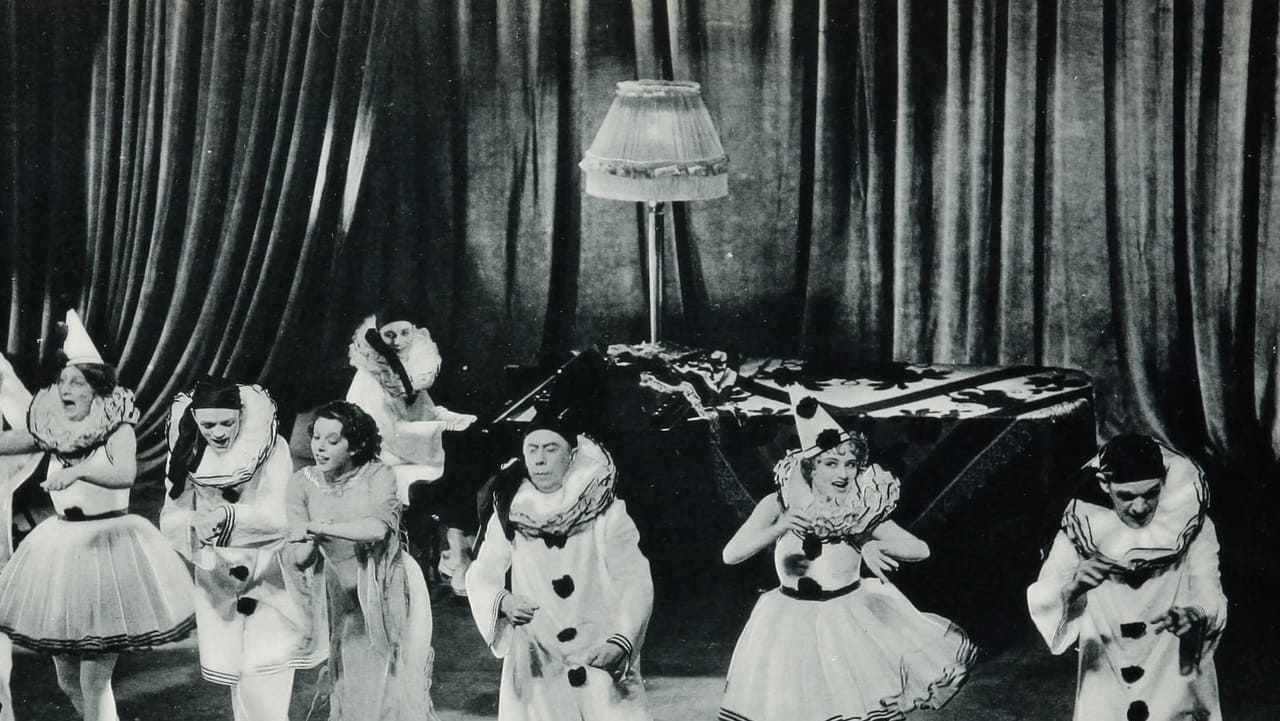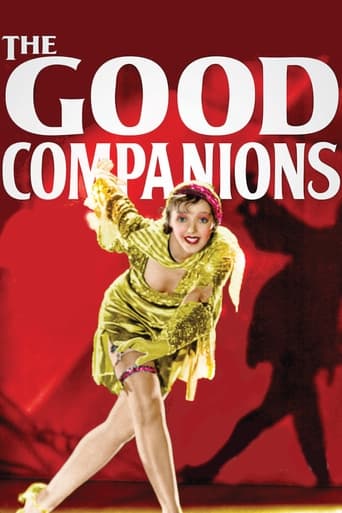

Too much of everything
... View MoreBlending excellent reporting and strong storytelling, this is a disturbing film truly stranger than fiction
... View MoreThe movie's neither hopeful in contrived ways, nor hopeless in different contrived ways. Somehow it manages to be wonderful
... View MoreAmazing worth wacthing. So good. Biased but well made with many good points.
... View MoreThey call em' the Dinky Doo's, and not as in Jimmy Durante's Inka Dinka Doo. They're a British vaudeville team traveling through the boon-docks and befriend a group of lonely people, including shy Mary Glynne, suave John Gielgud and aging Cecil Kellaway. While the first part of the story focuses mainly on Ms. Glynne (whose car has been mistaken for another one), the second half turns attention to the singing and dancing Jessie Matthews, England's answer to Eleanor Powell and equally adept in comedy and romance. Fans of the older Gielgud will marvel at seeing him much younger (and with hair!) and he is more than adequate in a romantic role, not at all pompous or uppity. It is thanks to Ms. Glynne that the troop's name changes to "The Good Companions" and focuses on the desire to get Ms. Matthews discovered by a major producer in London.While it is ironic that the song Ms. Matthews sings for the producer sounds very much like "If I Could Be With You", a standard heard in several Warner Brothers films of the same year, it is even more of a coincidence that the producer has an ear for "new" songs which he's heard before. There's a funny montage of "The Good Companions" touring and performing the same act to dwindling audiences because of the summer heat. While some Americans might be reluctant to watch because of a false sense that they'll understand the British humor, it is actually quite subtle and gives us Yanks an understanding of the British culture of the 1930's beyond what little material has been available to us.
... View MoreThis is just the most splendid movie. It is about a group of strangers coming together to help out a stranded troupe of players, calling themselves "The Dinky Doos". All of the cast were wonderful but Jessie Matthews was a revelation as Susie Dean and seemed to grow in confidence as the movie progressed. Amazingly, she had not been keen to star in the film. She had appeared in a couple of films with unsympathetic directors and had lost confidence about the way she photographed and her ability in front of a camera. But Victor Saville was a different type of director - more sensitive and helpful and he personally conducted Jessie Matthews screen test for the role. In addition, she was also surrounded by old friends - Edmund Gwen, who had known her from her "Andre Charlot's Revue' days and Richard Dolman, who had starred with Jessie at the Pavilion. She, in turn, was able to help John Gielgud - it was only his second talkie.Three strangers find themselves in Rawnsley - following their dreams. Jess Oakroyd (Edmund Gwen) has fled a nagging, shrewish wife (Jack Hawkins has a small part as a lazy lodger). Miss Trant (Mary Glynne) has looked after her parents all her life - even forfeiting her one chance of romance. Now she is on her own and wants a bit of freedom. Indigo Jolivant (John Gielgud) is a young teacher who takes the first chance to break free of the constricting school life. After some adventures, the three of them find themselves in a cafe with the Dinky Doos - a traveling troupe who are stranded after their manager takes off with all their money.Immediately Miss Trant takes charge and with her inheritance money, stakes them for 10 weeks to make good ....or bust!! She becomes their manager, Indigo writes their songs and Jess becomes the handy man. In the first of their many tiffs, Susie takes offence when Indigo turns up his nose at her songs and says he could write better ones. When she stomps off he gives her song "Lucky for Me" to Jerry (Richard Dolman) who thinks it's the best song he has ever heard.Things are not going great for the Good Companions (as they have re-christened themselves). Miss Trant has booked halls around the seaside areas - thinking of the rainy English weather, but that year there is a heatwave and instead of packed halls they are playing to empty ones because everyone is down at the beach. Just as they are down to their last shilling and are ready to give up, the rain is heard pattering on the roof. That turns into applause as Susie goes into her dazzling dance to "Three Wishes". It is a wonderful bit of cinema.After that the world is their oyster and Susie dreams of conquering the West End. Indigo works behind the scenes to give her her chance, by trying to sell his songs to a West End producer - Susie, of course, doesn't realise it until the end. She is also doing a bit of string pulling, trying to get Miss Trant and her long lost sweetheart together, even if she has to fake a heart attack to do it!!! I cannot watch the end without crying my eyes out, as the Dinky Doos benefit performance is marred by hecklers and a fire. Susie is inconsolable, thinking she has lost her chance of success (the producer, Finlay Currie) is in the audience. But he is not put off and to the chant of "We Want Susie", she comes back on stage, to sing with a tear stained faced "Let Me Give My Happiness to You". As the song plays on, the film comes to a close - Susie becomes a West End star, dancing in a beautiful glittery vagabond inspired costume, Indigo leading the orchestra, Miss Trant and her sweetheart renew their love and Jess sets sail for Canada to visit his beloved daughter.I think everyone in the world should see this film. Set in a time when strangers helped strangers, everyone pitched in to do their best and the Dinky Doos motto was "Just Do It"!!!Highly, Highly Recommended.
... View MoreI always preferred this film to the book although Priestley was an accessible and clever writer his sub-Dickens style and standard left wing leanings (ie support of state capitalism and not socialism) put me off a little. And of course on a much more important if shallower level to me the 25 year old Jessie Matthews was the main thing in here!Four separate people in provincial Britain are on the tramp to somewhere after leaving their homes, jobs etc to search for life and adventure. They all converge at Rawsley in the Midlands on a jolly pierrot troupe on its last legs called the Dinky Doos, join them and eventually turn their fortunes around as The Good Companions after it starts raining. There's an endless great British cast, most notably simple Jess Oakroyd from Bruddersford (surely Bradford/Huddersfield?) who was played by avuncular Edmund Gwenn with an OTT Yorkshire accent and talented Inigo Jollifant by angular John Geilgud with an OTT Cambridge accent. The rising star of the troupe Susie Dean was played by lovely Jessie Matthews who had two spellbinding songs, Three Wishes sung with Geilgud and a magically tear-struck Let Me Give My Happiness To You the money shots are her close ups during this! There was a fine orchestral accompaniment throughout and with only occasionally hokey lapses the production was superb. The solitary message is plain: working together to overcome adversity for a common purpose - even though the ending is altered from the book the various outcomes are the same.Altogether a memorable film for the non-serious looking for innocuous entertainment from another world, the serious should stick to the book as Priestley's works are Art. Absolutely!
... View MoreJB Priestley was arguably the finest popular novelist of the first half of the 20th century.Deeply affected by his experiences in the trenches during the 1914 - 18 war,he wrote with compassion about recognisable human beings in situations that struck a chord with the British reading public right up to his last great work "Lost Empires". After the war he went up to Trinity Hall,Cambridge,in whose library there is First Edition of "The Good Companions" accompanied by a letter in which he expresses bewilderment at the success of a work he felt was no better nor worse than his earlier output. Whatever the author felt,it was plain that commercially the book was hugely popular,going into dozens of editions and still in print 75 years later. With the passing of time the appeal of the lost world of concert parties ,runabouts ,charabancs cloche hats,Corner Houses and nicely mannered young men who could play the banjo but didn't has increased. The romance of the road has long gone,replaced by Motorway Madness,but the flickering black and white images of artillery - wheeled lorries grinding along the Great North Road evoke some sort of race - memory even amongst today's motorists. Watching the 1933 version of "The Good Companions" is a joyful experience.The innocence of it all,the joie de vivre,the excitement is a salutary lesson to the present cold - hearted calculating and faux wordly - wise generation of entertainers. What a great star Jessie Matthews was!It's pointless bemoaning the lack of her like today;simply put she was a product of her time the way Martine McCutcheon, say,is of hers. Edmund Gwenn and,perhaps surprisingly,John Geilgud,grab your attention from the start and hold onto it throughout the film. But principally this is an ensemble piece with every one of the Dinky Doos making a telling contribution. "The Good Companions" sends us a message from the depression - hit Britain of the early 1930s ,one that at least one mega - Corporation have taken on board....."!Just Do it".
... View More